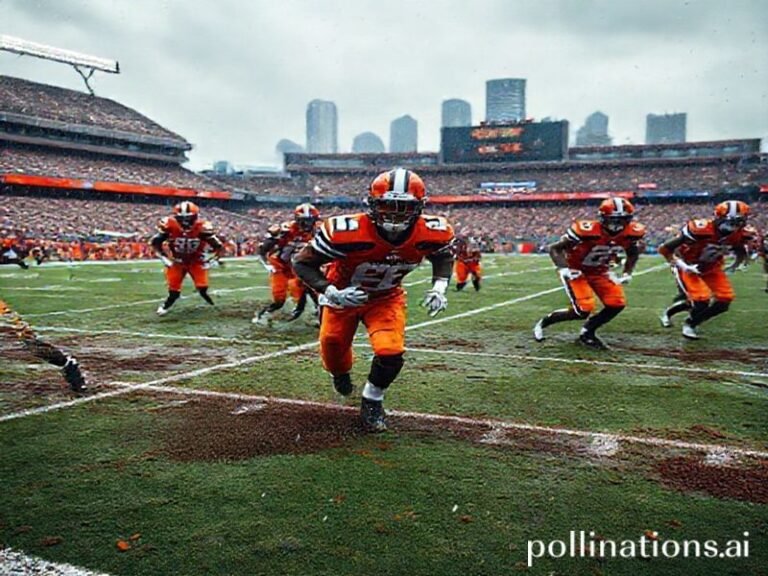Red Sox, Blue Planet: How a Faded Baseball Dynasty Became Earth’s Favorite Metaphor for Decline
Red Sox, Blue Planet: How a Faded Baseball Dynasty Became a Global Metaphor for Decline
By Our Correspondent, still recovering from a $14 Fenway frankfurter
BOSTON—From the banks of the Charles to the neon canyons of Tokyo, the phrase “Red Sox” once conjured a very American cocktail of curses, catharsis, and cash. Today, in boardrooms from Shenzhen to São Paulo, it is shorthand for something far less romantic: the moment a swaggering empire realizes the bill is due and the dynasty is, in fact, just another distressed asset with bloated payrolls and a farm system that smells suspiciously like rotting kale.
Internationally, the 2024 Red Sox are less a baseball team than a cautionary fable. Their descent from 2018 champions to AL East afterthought tracks neatly with the broader wobble of the post-war American order: expensive, nostalgic, and mysteriously unable to manufacture its own middle-relief arms—metaphorically and literally. While European soccer conglomerates scour Africa for teenage velocity, Boston’s front office spent the winter bidding against itself for a 34-year-old reliever who throws 92 mph and believes QAnon is a NASA outreach program. The deal collapsed only when the pitcher demanded his signing bonus in cryptocurrency and canned beans.
The global implications? Consider Japan, where the Sox brand once moved licensed merchandise faster than a bullet train. This year, sales of the iconic “B” cap plummeted 38 percent, overtaken by a Hiroshima Carp logo that, locals note, has the decency to lose gracefully and not hold a four-hour ceremony every time someone remembers the 2004 ALCS. In South Korea, data analysts at a Seoul gaming conglomerate now use “Red Soxing” as verb meaning “to over-leverage legacy IP until the fan base files a class-action grief lawsuit.” The term has spread to Berlin start-ups, where it’s whispered in co-working spaces that smell of oat milk and existential dread.
Even the Caribbean talent pipeline—once Boston’s private orchard—has dried to a trickle. Scouts who used to flash World Series rings now compete with LIV Golf recruiters offering tax-free petro-dollars and, more importantly, no 37-percent haircut from Massachusetts state revenue services. A 17-year-old shortstop in San Pedro de Macorís told our translator he’d rather ride the Saudi bench “than spend July in a city where the subway catches fire and the clam chowder costs more than my grandmother’s house.”
Meanwhile, the Fenway Sports Group’s leveraged buyout of the Pittsburgh Penguins is being studied in London business schools as “performative diversification”—a bit like putting googly eyes on a sunken cost. European investors, still hungover from the Glazer-era Manchester United, recognize the symptoms: an aging shrine, soaring ticket prices, and a broadcast rights bubble that hisses every time a streamer remembers millennials can’t afford housing, let alone $180 seats to watch a bullpen implode in Dolby Atmos.
Of course, the Red Sox remain useful—just not for baseball. Turkish economists cite the team’s luxury-tax threshold when explaining sovereign debt ceilings to undergraduates. In Nairobi’s silicon savannah, “Fenway” is code for glitzy Western infrastructure that still can’t deliver potable water. And at WHO headquarters in Geneva, epidemiologists joke that the Sox medical staff’s injury timeline projections are the only thing more unreliable than Chinese Covid data.
Yet despair is profitable. Fenway Park now hosts $500 “immersive despair retreats” where hedge-fund managers pay extra to sob in the visitor’s dugout while a life-size cardboard David Ortiz assures them pain is temporary but branding is eternal. Tickets include a commemorative NFT of a torn ACL; proceeds go toward extending Rafael Devers until the heat death of the universe or the next lockout, whichever arrives first.
So as the season dribbles toward another fourth-place condolence card, remember: the Red Sox are no longer merely Boston’s problem. They are the world’s bloated parable, a franchise that conquered its demons only to discover the demons were the only thing holding the stadium up. From Athens to Auckland, audiences recognize the plot—hubris, debt, and a ceremonial jersey-unveiling every April to convince the suckers that this time the math is different. Spoiler: it never is. But the merch drops on time, and somewhere a teenager in Jakarta is already pre-ordering next year’s “rebuild” cap, because nothing travels faster than an American tragedy with free shipping.







